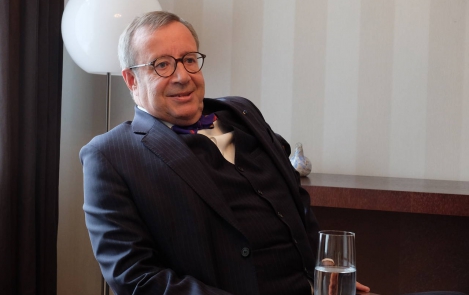-
Reset
+

"Estonian Leader Says He’s Unconcerned About Trump’s Praise for Russia, Wavering on NATO", The Wall Street Journal
18.08.2016
By Drew Hinshaw and Liis Kängsepp
'What's there to be nervous about?' asks U.S.-reared Toomas Hendrik Ilves.
TALLINN, Estonia – The president of this small, Baltic nation doesn't think Donald Trump, as president, would actually abandon it in a hypothetical attack by Russia.
In an interview, Wednesday, President Toomas Hendrik Ilves said he thinks Mr. Trump's frequent praise for Russia and its government "is all election rhetoric."
"What's there to be nervous about?" said Mr. Ilves, an American-raised ex-English teacher whose parents came to the U.S. as refugees from the Soviet Union.
In a July interview with the New York Times, Mr. Trump suggested he wouldn't lend military aid to Baltic NATO members attacked by Russia unless they had "fulfilled their obligations to us." The Republican presidential candidate hasn't specified what those obligations are, but NATO generally asks member states to spend 2% of their gross domestic product on their militaries.
"It's part of the election cycle," said Mr. Ilves, whose government has met its 2% target. "My gut feeling says that a huge change of course is probably unlikely: You've been following a certain line since 1945."
Mr. Ilves, whose presidency ends this year, has been among Mr. Trump's most vocal critics in Europe, at least on Twitter. In July, he quibbled on Twitter with a supporters of Mr. Trump, in a brief but widely seen exchange.
"I think he was a Russian troll," said the president of his Twitter interlocutor. "I get like one or two a day."
Mr. Trump's candidacy – with his repeatedly-stated disinclination to spend money defending American allies abroad – has raised, deep existential questions for Estonia. A sliver of land home to just 1.3 million, the country has been traded between empires for centuries.
In 1991, after securing its long-sought independence from the Soviet Union, Estonia embraced the West. The country entered the European Union, adopted the euro, joined NATO and sent troops to Afghanistan, Iraq, Mali, and elsewhere.
Now, some officials here worry that the West no longer has the political will or resources to continue protecting Estonia. On the other side of its border, Russia boasts surface-to-surface missiles and tank divisions capable of seizing all three Baltic states within 60 hours, according to a recent analysis by the Rand Corporation, a Santa Monica, California-based think tank.
Several of Estonia's closest advocates in the Republican Party have begun to adopt Mr. Trump's view, including Newt Gingrich, who as speaker of the House in the 1990s, helped paved the way for Estonia's entry into NATO.
More recently, Mr. Gingrich suggested the country might not be worth defending from Russia, and calling Estonia "the suburbs of St. Petersburg."
All this has left many here with a less optimistic view than the Estonian president. For two months, Estonian diplomats have been trying to make contact with Mr. Trump himself, or his campaign, to feel out his views on Russia, said Kadri Peeters, a security policy adviser to the country's prime minister.
"But it's so difficult to get in touch with Trump's campaign people, because there's nobody there," she said. "All of this is quite dangerous. We are worried."
Original article on The Wall Street Journal webpage.

